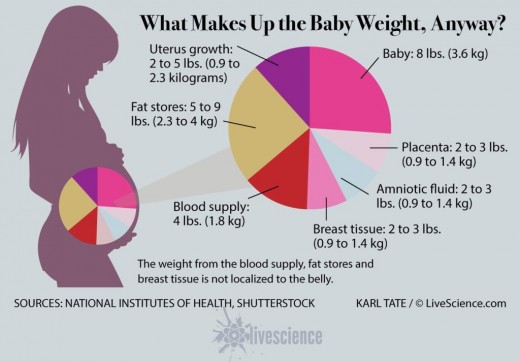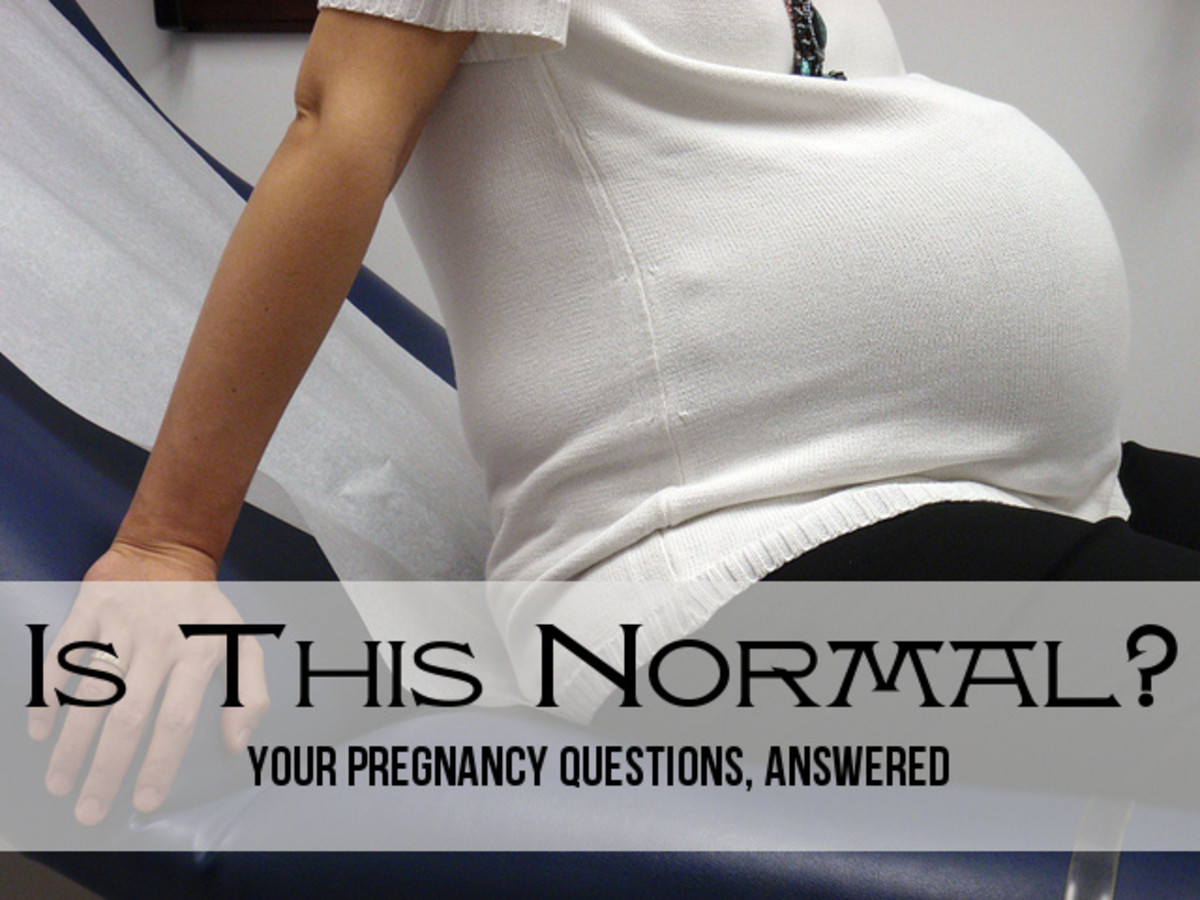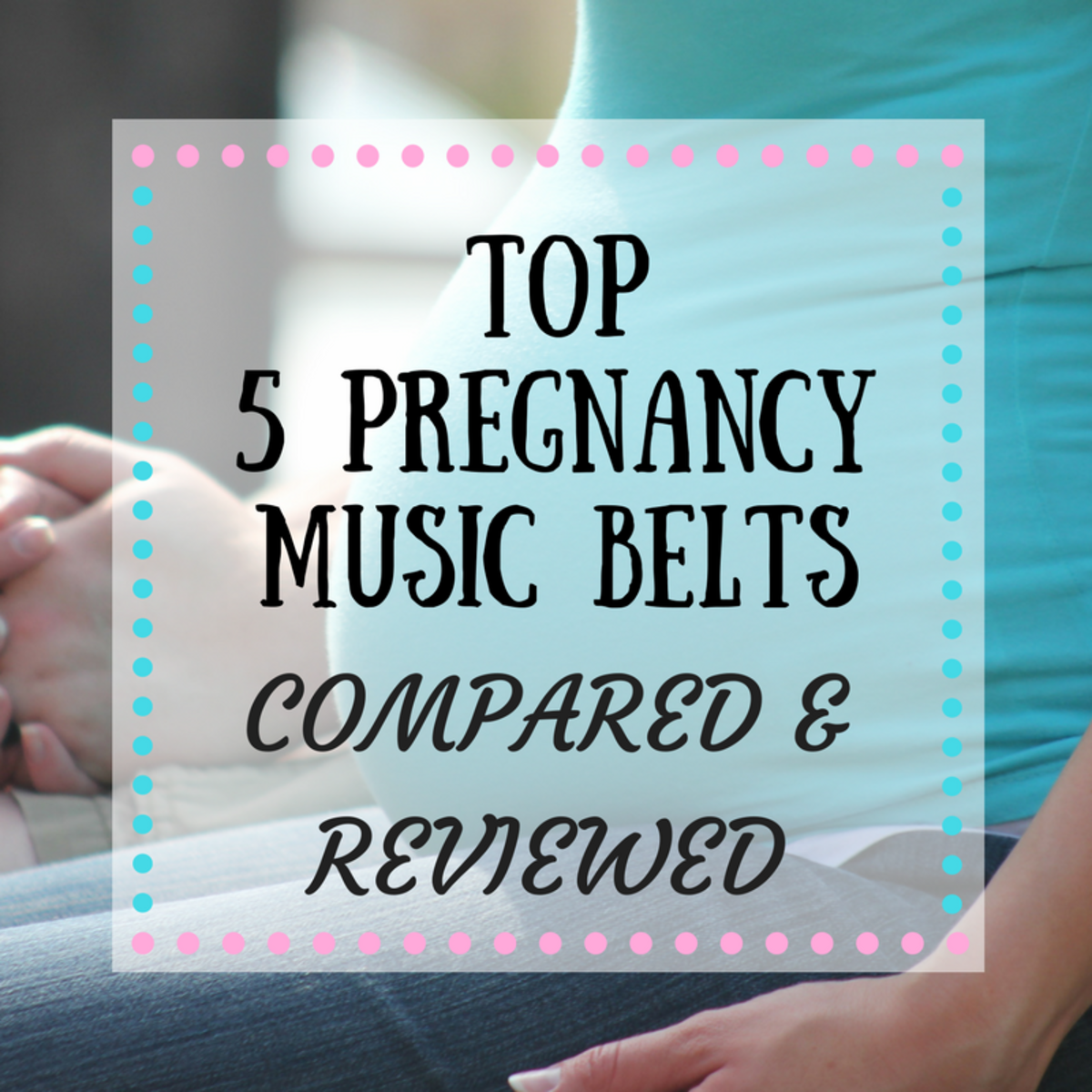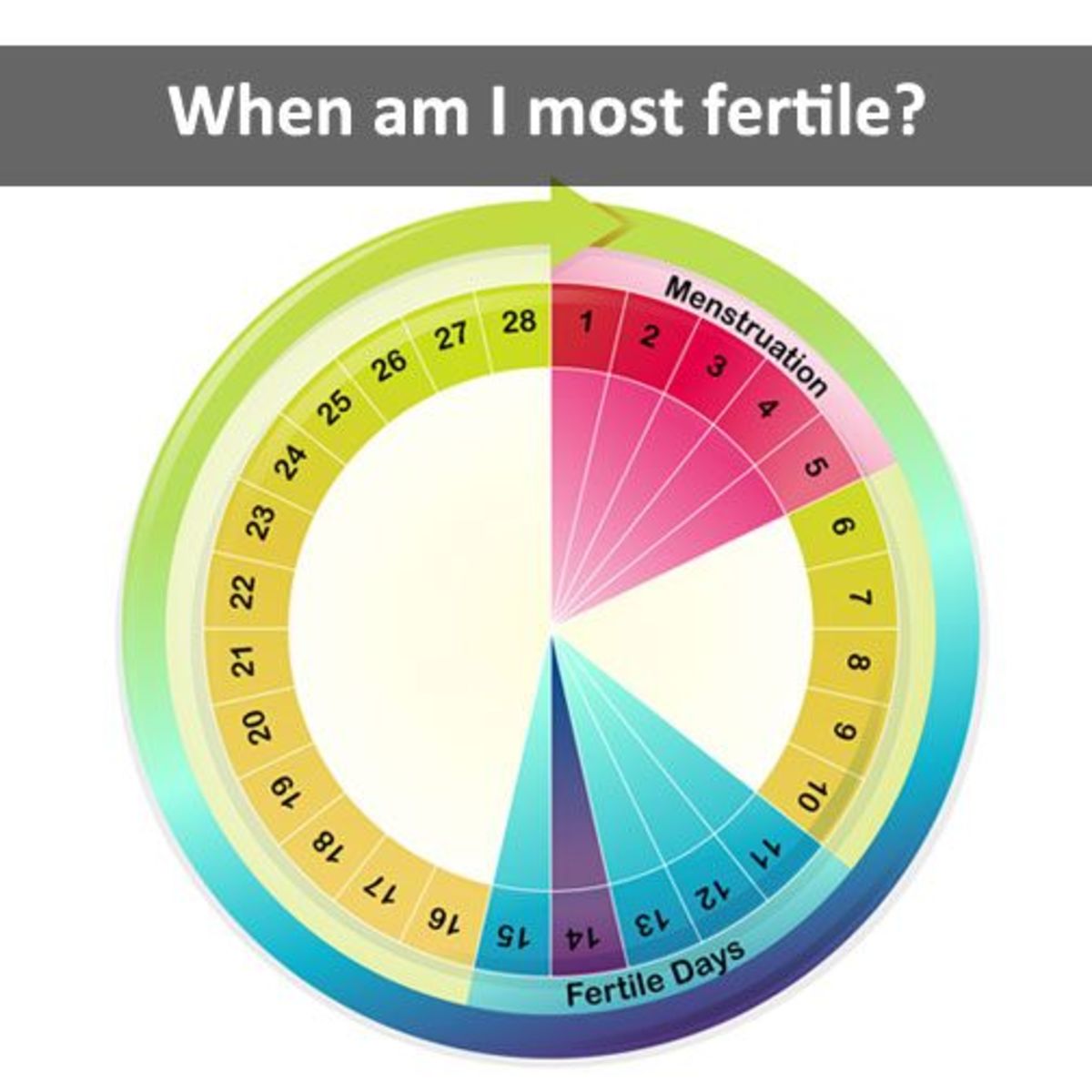- HubPages»
- Health»
- Women's Health»
- Pregnancy
Suggested Weight Gain for a Healthy Pregnancy

So there's this crazy idea that once a woman finds out that she's pregnant, not only can she start eating twice as much, but should. In fact, it's encouraged, because she is after all "eating for two" now. But you're not eating for two adults. You are eating for one adult growing a very small person inside.
This statement is very misunderstood. Yes, you are growing a human being inside you now, and you may need a small amount of additional calories to keep up with what your body is burning, but developing bad habits now can cause you more problems later.
Overeating and overindulging during pregnancy, because you think it's okay, can cause unneeded strain and stress on your body, and will create that much extra weight that will be harder to lose after the baby is born. However, the same goes for not eating enough.Not getting the nutrients you and your growing baby need right now will not only cause you serious health problems, but can cause birth defects in your little one as well.
A healthy diet rich in the necessary nutrients for growing a baby is essential for your health and the health of your pregnancy. This is why there is a recommended weight gain for women during pregnancy. Too much food and even too little can cause birth defects, gestational diabetes, preterm labor, premature babies, and a host of other problems that can be hard, if not impossible to recover from.
To know how much is okay to eat, it's important to consider how much weight is appropriate for you to gain during a healthy pregnancy. I've tried to make this much easier to understand below, so you can make the best decisions for yourself and your pregnancy possible.

How Much Weight Should You Gain?
It's reasonable that you will be eating more than usual as your pregnancy progresses. In fact, at only two months pregnant, I was already eating a great deal more than I normally would have, but every morning I was back to my normal weight. There's a great deal going on inside your body during this time. In fact, one thing I've heard that really helped me to understand what was going on, was that a pregnant woman at rest is working harder than a non-pregnant woman mountain climbing, or even running a marathon.
It sure felt like I was running a marathon or mountain climbing, and thankfully, with all of my pregnancies, I've been able to stay at home and relax for the most part. Although, women doing a great deal of exercise are likely losing weight and gaining muscle, and it's inevitable that you'll be gaining weight.
But How Much is Enough?
For a woman at a normal healthy weight (with a normal BMI) before pregnancy, she should gain about 30 pounds during the course of her pregnancy.For those women considered underweight (with a below average BMI) before pregnancy, they are recommended to gain more like 35 pounds. For those women considered overweight (with an above average BMI), it's only 25 pounds.
Calculate Your BMI (Body Mass Index) here!
If you're considered obese before pregnancy, the limit drops yet another 5 pounds to only 20 pounds you should strive to gain during pregnancy. The reasoning behind these numbers is simply to make sure that both you and your baby have a safe and healthy pregnancy, all the while getting the nutrients you need.
Your baby, and all of the parts that go with him or her all have their own weight as well, like the placenta, the amniotic fluid, the umbilical cord, and your fat stores to keep the baby growing and healthy. (About 15 pounds drops off right after delivery!)
__________________________________________________________________
Expected Weight Gain Each Trimester:
First Trimester (1 to 5 pounds)
Second Trimester (1 pound a week - about 10 to 13 pounds)
Third Trimester (1 pound a week - about 10 to 13 pounds)
__________________________________________________________________
Quick Poll
How far along are you in your pregnancy so far?
How Do I Gain the Right Amount of Weight?
The trick to gaining exactly the amount of weight you should be gaining for your height and weight is easy. Simply eat a healthy diet, consume a consistent amount of food every day, and get regular but moderate exercise 2-3 times a week. In fact, it's highly advised to get a good healthy breakfast (with healthy protein, not sugar), and then eat another 5-6 small meals throughout the day. This is a healthy routine for anyone and everyone.
This may sound easier to say than to do. Eating during pregnancy is all about consuming the right foods in the right amounts. Aim for getting in all of your food groups, if possible, everyday. The experts may advise that you gain anywhere from 25 to 40 pounds during your pregnancy, depending on your pre-pregnancy weight, but this is not something you have to be trying to do yourself.
Strangely enough, your body is already pre-programmed to do this on it's own. From before I even knew I was pregnant each time, my body already needed much more food than normal to satisfy it. Just think, hearty breakfast, mid-morning snack of something wholesome, reasonable lunch, another snack, or two throughout the afternoon as you get hungry, and then a reasonable dinner. Depending on how early you eat dinner, you may also need another snack before bed.
When I First Started Gaining Weight
I remember being alarmed my first pregnancy when I began gaining weight. I weighed myself one night and I had gained 6 pounds in one day! Then a funny thing happened. It was all gone by morning and I was back to normal. The hunger, and cravings did not go away, but my body became used to the extra food, returning to my original weight every morning.
I felt like I was eating us out of house and home that first six week and didn't know how I was possibly going to gain the weight I was supposed to if the extra food I was already eating wasn't doing it. There was no way I could eat more without exploding. But closing in on the end of your first trimester, your metabolism naturally starts slowing down, and begins to hold on to more of the calories you're already consuming. The first trimester you should only be gaining 3-5 pounds for the whole three months.
I didn't like all of the pressure put on me by everyone to eat more. There is no need for you to change anything. Just eat good healthy snacks, or drink water, when you're hungry. It was really nice to know that my body was going to take care of gaining the weight I needed all on it's own.
Even though you don't have to worry about eating enough to gain the extra weight you need, you'll still want to monitor that you're not eating too much. Can you imagine what will happen if your metabolism slows down and you're purposely eating twice as much to gain weight?

What If I Gain Too Much Weight?
Whether you're pregnant or not, eating and staying healthy is always about keeping everything in perspective and eating your favorite items in moderation. Before getting pregnant the very first time, I weighed 138 pounds. I ate a healthy diet, I moderately exercised taking my puppies on an hour walk or so every other day, and I monitored my food intake to make sure I wasn't eating just for the sake of eating.
In fact, when I first met my husband, I started gaining a great deal of weight and didn't know why. By paying close attention I noticed that he was a slow eater, so as long as he was still eating, so did I. That was a bad idea. I was no longer paying attention to my body and was overeating.
By eating my meals off of a salad plate from then on out, and not going back for seconds, I quickly returned to my ideal weight. The same thing happened around my wedding, except I learned that by drinking more water and cutting back on the sweet tea I was drinking, the weight once again fell off. I was 132 pounds when we were married.
Your Body Knows What It Needs
Pregnancy is no different. Your body knows what kind of food it needs and how much it needs. If you are willing to pay attention to it, it will tell you what you need to know. Don't worry if you feel like you need more. Go get it. Follow your body's cues. It's trying to tell you something important.
However, make sure to make healthy choices when you get hungry. Pay attention to your body. It will let you know when you are full. There's nothing that says you can't go get another snack in a couple more hours if you still feel hungry. Consider cut up fruit or veggies, whole wheat crackers, raw nuts and seeds, full fat cheese, yogurt, etc.
If You See the Scale Going Up More Than It Should...
If you are gaining more weight than recommended, consider these things. What kind of food choices are you making? What do your portions look like? And you can even consider where you might be getting extra sugar or calories that you might not need.
Did you eat an entire bag of Cheetos instead of just a small handful? Did you really need the whole pizza or that extra glass of sweet tea? Cut back in small ways until you see the weight coming off. It's also important that you are getting the exercise you need, even if that means a walk around the neighborhood, or a nice yoga class for pregnancy 2-3 times a week. Whatever you do though, DO NOT try to diet during pregnancy. Once the weight is on, you should never purposely try to take it off.
Honestly, just get rid of refined sugars (added sugar or even sugar free, low fat, or diet items) and processed foods (anything pre-made like chips, cereal, lunch meat, etc.), and go for more natural options as much as possible, and this won't be a concern. The same rules apply here that would apply if you weren't pregnant. Healthy food choices, appropriate food portions, and regular exercise will help you to keep your weight where it belongs. But what if your concern is not getting enough calories?

What If I'm Not Gaining Enough?
Most women do not have this problem, but there is the same risk to your baby not gaining enough weight as there is by gaining too much. The weight you are supposed to gain during pregnancy is not just a recommendation but very necessary for you and your baby to be healthy throughout your pregnancy.
Although, there is one point in your pregnancy where this won't be so critical. As morning sickness is very prevalent in the first trimester, many women also see some weight loss during this time. This is perfectly normal. Many women don't gain anything during the first trimester because they simply can't keep anything down, or might even lose some weight. Once the morning sickness subsides, you should start seeing the weight slowly come back.
As long as your body catches up the rest of your pregnancy, there is no danger to you or your infant. However if you're still pretty far behind in your second, and especially your third trimester, you may need to take extra steps to help your body along. Please don't try packing on the weight though. Protein shakes and weight gaining drinks aren't safe for either of you.
What Can I Do Then to Help Gain Some Extra Weight?
Consider just adding more calorie-rich foods to your regular meals like avocados, nuts, and cheeses. Plan on a simple snack between meals, at least 2-3 times a day. You could have some granola, guacamole or hummus with whole wheat tortillas, trail mix, or even some fruit with peanut butter.
Can't stand thinking about eating more? I completely understand. At times I thought I was going to burst. Consider instead making some yummy smoothies with veggies and wheat germ. This way it won't feel like you're eating more, but you're still getting the extra good calories you need for you and your growing baby.
If this still doesn't work, think about where you might be burning critical calories, or what you might be eating that could be providing you little to no quality nutrients. Obviously you should cut out sodas, but consider also nixing big leafy iceberg salads, subbing in one with more nutrients instead like adding fresh spinach, romaine or kale, or by making it an egg salad or chicken salad instead.
Even though exercising is important during pregnancy, if you are still keeping up that hefty running schedule, or have a vigorous workout routine, consider toning it down for something not quite so hard-core. That might easily be where you are losing the weight. Pregnancy is not the time to watch your figure and lose weight. Your health and that of your baby is more important than your waistline at this point.

How Quickly Does the Weight Go Away After Delivery?
This really depends on the woman, how much weight you're trying to lose, and whether or not you're breastfeeding. Ideally 10-15 pounds should come off right away as this is all baby and placenta weight.
If you're breastfeeding, you'll obviously still be eating more than normal to make up for the calories you'll be losing in your breastmilk. On average, breastfeeding burns about 500 calories a day, which is roughly the amount of extra calories that you are supposed to be consuming. Breastfeeding women tend to lose weight more quickly than women who do not. But if you're not breastfeeding, no worries. With a continued healthy diet and regular exercise, just like when you were pregnant, your body will naturally return to normal in time.
When Will I Return to My Normal Weight?
On average, women are recommended to gain about 30 extra pounds while pregnant. With half of that disappearing just after delivery, that only leaves you with roughly 15 more pounds to lose. With your body naturally losing weight as you return to normal, you can expect to be back to normal within 6-7 months, but this time frame may be longer or shorter for each woman.
Within 6 months is the average for most women to return to their pre-pregnancy weight, but this means you still have to be watching the kinds of foods you are eating, making sure to stay on a healthy diet, watching your food portions, and maintaining a regular exercise schedule, even if just moderate, 2-3 times per week. This may just be walking around the block, or climbing the stairs in your home.
For those considering getting pregnant again soon after, these tips are still the same if you are going to have a healthy next pregnancy. You certainly don't want to bring extra weight into a new pregnancy.

Gaining weight is not only inevitable during pregnancy, but it is healthy and necessary. The trick is simply gaining the right amount of weight and the right kind of weight. Many people have the misunderstanding that pregnancy is a free pass to eat anything you want for nine months, when in fact, doing just this can be harmful to your health and that of your growing infant during this fragile time.
If anything, pregnancy is the perfect time to integrate a variety of healthy foods and discover a new way to enjoy your meals. Cut out the caffeine and alcohol, drop the greasy, fatty fried foods and fast food, and learn how to use healthier ingredients to make delicious snacks and meals.
_________________________________________________________________
Side note: The more variety you have in your diet while you're pregnant will increase the likelihood of your child eating more diverse foods as well. At this time in his or her life, not only are you growing a baby, but you are training developing taste buds what to like in the future. By providing healthy, wholesome foods to your developing baby during pregnancy, you are giving your body the ability to create a healthier baby with a stronger immune system for life.
_________________________________________________________________
Add in a little moderate exercise and portion control to your already healthy diet, and you've got the perfect recipe for a healthy pregnancy, and just the right amount of weight. If you can keep in mind, healthy foods throughout the day when you're hungry, and not to overeat because you're pregnant, you'll stay on the right path. Check out my article on Great Foods to Eat When Your Pregnant for some yummy ideas!
© 2014 Victoria Van Ness





